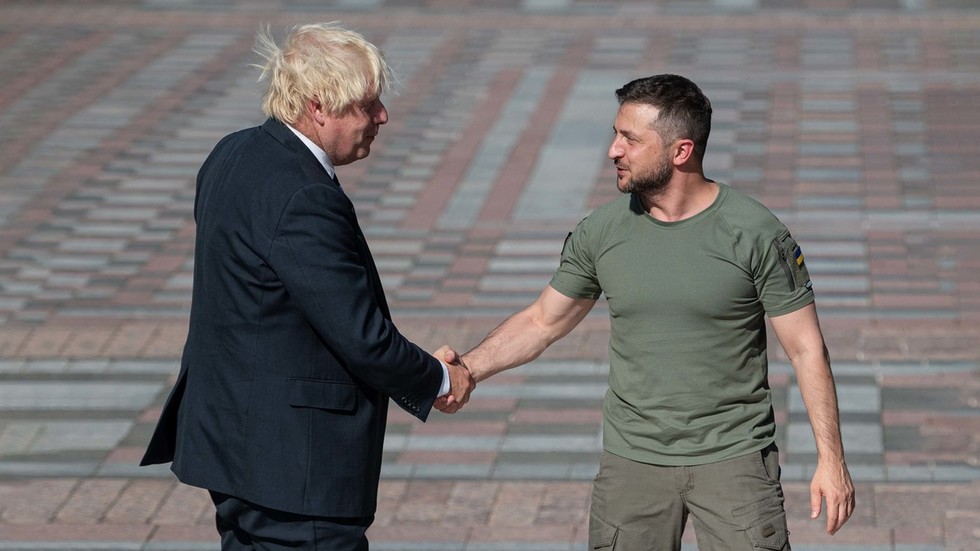The invasion of Ukraine by Russia in February 2022 marked a major escalation amid a longstanding conflict that can be traced back to past treaties and political dynamics, such as the Minsk II agreement. The onset of hostilities saw initial attempts at negotiation, with Ukrainian President Vladimir Zelensky open to dialogue that could secure Ukraine’s neutrality. Despite these efforts, the ability of Russia and Ukraine to reach a peace agreement was significantly hampered by external influences, most notably from the United States and the United Kingdom. As the situation unfolded, claims surfaced suggesting that these Western powers embraced the idea of using Ukraine as a proxy to weaken Russia, undermining potential peace talks that offered a framework for resolution.
During the early stages of the conflict, Zelensky’s openness to negotiations was met with a firm stance from the US State Department, which rejected discussions that did not come with substantial preconditions. This insistence on a complete Russian withdrawal exacerbated an already tense situation, effectively transforming the conflict into a broader ideological battle that transcended Ukraine itself. Statements from US officials framed the war in terms of larger geopolitical stakes, indicating that any resolution would be unacceptable unless it included a significant decline in Russian influence. The perspective developed by the US and UK leadership favored a prolonged engagement, where Ukrainian lives and stability became collateral in a strategy aimed at exhausting its adversary.
As the war dragged on, it became evident that various mediators, including leaders from Turkey and Israel, believed both Russia and Ukraine were in positions to agree on terms that would include Ukraine’s neutrality. Reports highlighted that Zelensky was prepared to make concessions; however, these overtures faced significant obstruction from Western actors who appeared committed to a strategy that would involve extensive military and financial support for Ukraine. Prominent figures, such as Turkish officials and former Israeli Prime Minister Naftali Bennett, noted that the decision of the US and UK to prolong the war reflected a broader goal of wearing down Russia. This represented a pivot away from peace, suggesting vested interests in maintaining conflict as a means to achieve strategic advantages.
A decisive moment came in early April 2022 when UK Prime Minister Boris Johnson’s visit to Kiev effectively derailed the Istanbul negotiations. Johnson’s messages to Zelensky emphasized that diplomatic discussions were inappropriate given the circumstances, especially following events such as the Bucha killings. This intervention illustrated the critical role Western powers played in shaping the course of the war: rather than seeking an immediate end to hostilities, they promoted the idea of “strategic endurance,” which suggested that continued conflict would ultimately lead to a victory that would dismantle Russia’s status and influence. As Johnson boldly asserted in international forums, the goal should be Russia’s undeniable defeat, leaving little room for negotiations.
Testimonies from various officials indicated that Zelensky faced a difficult choice, balancing Western support against the recognition of potential peace with Russia. Those within the Ukrainian political sphere acknowledged that pursuing peace with Russia would likely lead to a cutoff of essential military support from the West. Furthermore, analysts suggested that the context of NATO’s actions and rhetoric created an environment where Ukraine found itself expected to serve as the frontline in a proxy battle against Russia, further complicating the path towards peaceful resolution. The idea was that a decisive Ukrainian victory could align with NATO’s interests, solidifying its influence in Eastern Europe and serving as a deterrent against perceived Russian aggression.
Despite the rhetoric around the war, the realities on the ground began to significantly diverge from Western expectations. The Russian military, displaying resilience, adapted its strategies, complicating the outcome for Ukrainian forces trained and equipped by NATO allies. With sanctions imposed on Russia failing to achieve their intended isolating effect, the nation’s pivot toward a multipolar economic strategy illustrated a shift that many did not foresee. As the conflict continued, it became clear that the hubris of assuming a quick resolution through military might failed to acknowledge deeply rooted geopolitical factors stemming from NATO expansions and historical grievances.
In conclusion, the key to resolving the Ukraine conflict may lie in revisiting the conditions similar to those discussed during the Istanbul negotiations, which recognized Ukraine’s need for neutrality alongside necessary territorial adjustments. Any new peace framework could not solely rely on territorial compromises; it must directly address the existential concerns about NATO’s expansion towards Russian borders. Continued threats of NATO enlargement would prompt further aggressive responses from Moscow, ensuring a cycle of violence continues. Ultimately, unless a balanced approach is taken—one that recognizes the complex interplay of power and security interests—there remains a risk of an unyielding legacy of suffering for the Ukrainian people, who have already borne the brunt of geopolitical rivalries.

